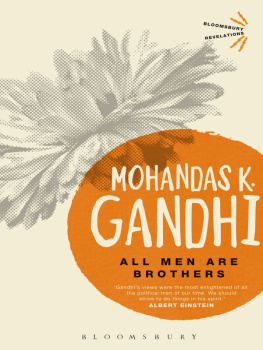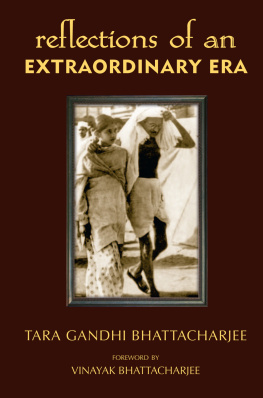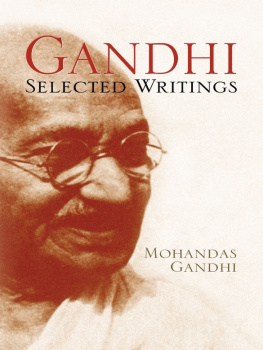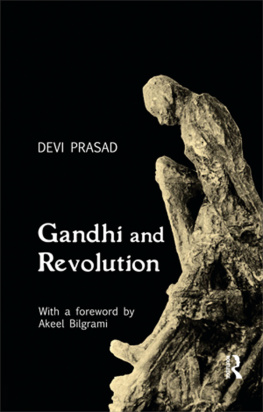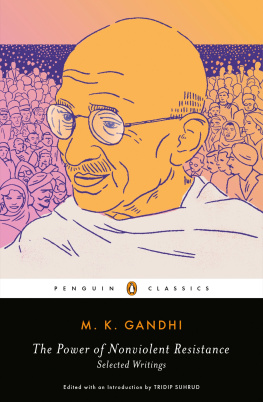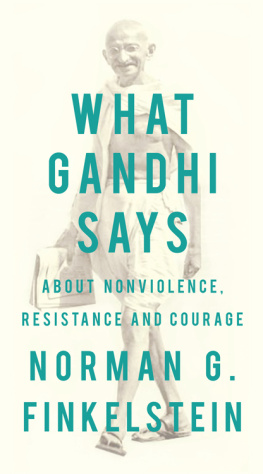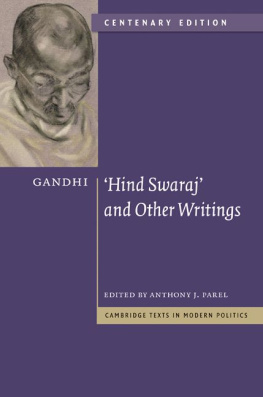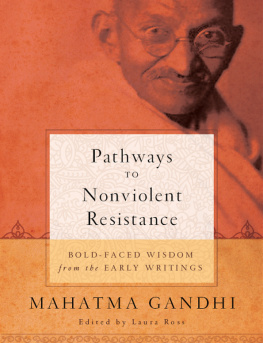TITLES IN THE BLOOMSBURY REVELATIONS SERIES
Aesthetic Theory, Theodor W. Adorno
On Religion, Karl Barth
The Intelligence of Evil, Jean Baudrillard
In Defence of Politics, Bernard Crick
Intensive Science and Virtual Philosophy, Manuel DeLanda
A Thousand Plateaus, Gilles Deleuze and Flix Guattari
Anti-Oedipus, Gilles Deleuze and Flix Guattari
Taking Rights Seriously, Ronald Dworkin
Discourse on Free Will, Desiderius Erasmus and Martin Luther
Education for Critical Consciousness, Paulo Freire
To Have or To Be?, Erich Fromm
Truth and Method, Hans Georg Gadamer
All Men Are Brothers, Mohandas K. Gandhi
Eclipse of Reason, Max Horkheimer
After Virtue, Alasdair MacIntyre
Time for Revolution, Antonio Negri
The Politics of Aesthetics, Jacques Rancire
An Actor Prepares, Constantin Stanislavski
Building a Character, Constantin Stanislavski
Creating a Role, Constantin Stanislavski
Some titles are not available in North America.
All Men Are
Brothers
Autobiographical Reflections
Mohandas K. Gandhi

Bloomsbury Academic
An imprint of Bloomsbury Publishing Plc
50 Bedford Square London WC1B 3DP UK
175 Fifth Avenue New York NY 10010 USA
www.bloomsbury.com
First published by UNESCO and Columbia University Press
1958
First published by Bloomsbury Academic 1980
This edition published 2013 by Bloomsbury Academic
The extracts from Gandhis works are reproduced by permission of the Navajihan Trust Ahmedabad-14, India
All rights reserved. No part of this publication may be reproduced or transmitted in any form or by any means, electronic or mechanical, including photocopying, recording, or any information storage or retrieval system, without prior permission in writing from the publishers.
No responsibility for loss caused to any individual or organization acting on or refraining from action as a result of the material in this publication can be accepted by Bloomsbury Academic or the author.
British Library Cataloguing-in-Publication Data
A catalogue record for this book is available from the British Library.
ISBN: 978-1-6235-6003-4
Library of Congress Cataloging-in-Publication Data
A catalog record for this book is available from the Library of Congress.
Contents
A great teacher appears once in a while. Several centuries may pass by without the advent of such a one. That by which he is known is his life. He first lives and then tells others how they may live likewise. Such a teacher was Gandhi. These Selections from his speeches and writings compiled with great care and discrimination by Sri Krishna Kripalani will give the reader some idea of the workings of Gandhis mind, the growth of his thoughts and the practical techniques which he adopted.
Gandhis life was rooted in Indias religious tradition with its emphasis on a passionate search for truth, a profound reverence for life, the ideal of nonattachment and the readiness to sacrifice all for the knowledge of God. He lived his whole life in the perpetual quest of truth: I live and move and have my being in the pursuit of this goal. A life which has no roots, which is lacking in depth of background is a superficial one. There are some who assume that when we see what is right we will do it. It is not so. Even when we know what is right it does not follow that we will choose and do right. We are overborne by powerful impulses and do wrong and betray the light in us. In our present state we are, according to the Hindu doctrine, only partly human; the lower part of us is still animal; only the conquest of our lower instincts by love can slay the animal in us. It is by a process of trial and error, self-search and austere discipline that the human being moves step by painful step along the road to fulfilment.
Gandhis religion was a rational and ethical one. He would not accept any belief which did not appeal to his reason or any injunction which did not commend to his conscience.
If we believe in God, not merely with our intellect but with our whole being, we will love all mankind without any distinction of race
This view leads naturally to the adoption of nonviolence as the best means for solving all problems, national and international. Gandhi affirmed that he was not a visionary but a practical idealist. Nonviolence is meant not merely for saints and sages but for the common people also. Nonviolence is the law of our species, as violence is the law of the brute. The spirit lies dormant in the brute and he knows no law but that of physical might. The dignity of man requires obedience to a higher lawto the strength of the spirit.
Gandhi was the first in human history to extend the principle of nonviolence from the individual to the social and political plane. He entered politics for the purpose of experimenting with nonviolence and establishing its validity.
Some friends have told me that truth and nonviolence have no place in politics and worldly affairs. I do not agree. I have no use for them as a means of individual salvation. Their introduction and application in everyday life has been my experiment all along. For me, politics bereft of religion are absolute dirt, ever to be shunned. Politics concerns nations and that which concerns the welfare of nations must be one of the concerns of a man who is religiously inclined, in other words, a seeker after God and Truth. For me God and Truth are convertible terms, and if any one told me that God was a God of untruth or a God of torture I would decline to worship Him. Therefore, in politics also we have to establish the Kingdom of Heaven.
In the struggle for Indias independence, he insisted that we should adopt civilized methods of nonviolence and suffering. His stand for the freedom of India was not based on any hatred for Britain. We must hate the sin but not the sinner. For me patriotism is the same as humanity. I am patriotic because I am human and humane. I will not hurt England or Germany to serve India. He believed that he rendered a service to the British in helping them to do the right thing by India. The result was not only the liberation of the Indian people but an increase in the moral resources of mankind.
In the present nuclear context, if we wish to save the world, we should adopt the principles of nonviolence. Gandhi said: I did not move a muscle, when I first heard that an atom bomb had wiped out Hiroshima. On the contrary I said to myself: Unless now the world adopts nonviolence, it will spell certain suicide for mankind. In any future conflict we cannot be certain that neither side will deliberately use nuclear weapons. We have the power to destroy in one blinding flash all that we have carefully built up across the centuries by our endeavour and sacrifice. By a campaign of propaganda we condition mens minds for nuclear warfare. Provocative remarks fly about freely. We use aggression even in words; harsh judgements, ill-will, anger, are all insidious forms of violence.
In the present predicament when we are not able to adjust ourselves to the new conditions which science has brought about, it is not easy to adopt the principles of nonviolence, truth and understanding. But on that ground we should not give up the effort. While the obstinacy of the political leaders puts fear into our hearts, the common sense and conscience of the peoples of the world give us hope.
Next page
